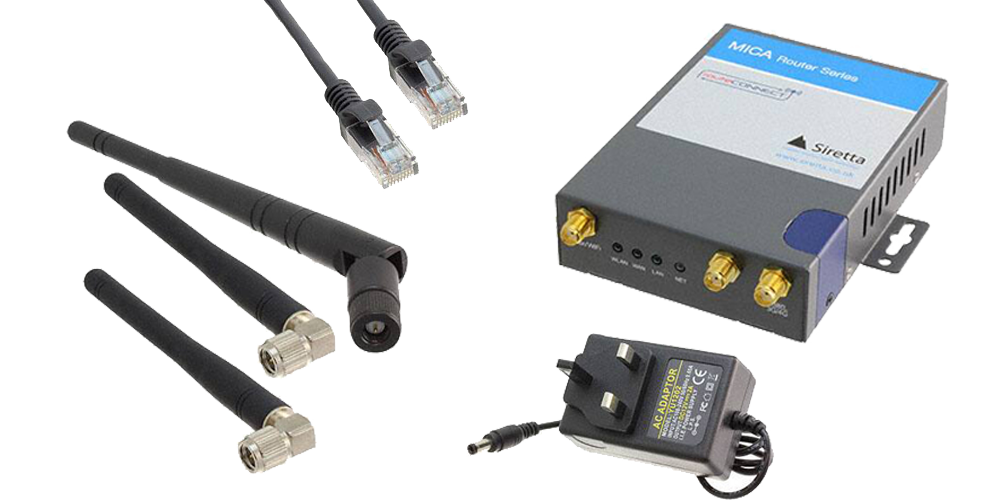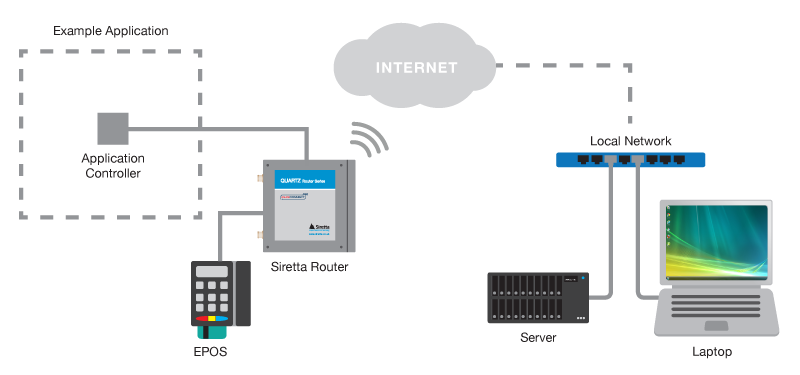The mobilisation of IIoT
The networking of industrial and commercial facilities is at the heart of digital transformation. Companies operating in sectors such as utility management, transport and manufacturing require reliable, always-available connectivity for their decentralised assets. Traditional wired broadband solutions are often impractical or uneconomical, especially in remote areas. The challenge is to create a robust communications infrastructure that not only enables fast data transmission but is also easy to implement, secure and cost-effective.
Siretta's industrial routers offer a comprehensive response to these requirements. They are designed as intelligent and resilient connectivity solutions that reliably connect Ethernet and RS232 devices via mobile networks. With their ability to manage data streams autonomously and intelligently, they enable a seamless connection between physical equipment and the digital world. The core advantages lie in their ease of deployment, robust construction for demanding environments, and intelligent redundancy, which ensures continuous data transmission. These routers are not just products; they are a crucial building block for the efficiency and security of distributed systems.

The Siretta advantage: a value proposition for the modern enterprise
In critical industrial applications, uninterrupted connectivity is of the utmost importance. Siretta's industrial routers are designed for maximum reliability. A central pillar of this strategy is dual SIM functionality, which allows two SIM cards from two different network providers to be operated in the same device. If the connection to one network is lost, the router automatically and seamlessly switches to the second provider. This redundancy is crucial for business-critical processes where any failure is costly.
The reliability of the device goes beyond the hardware. The routers are equipped with predictive maintenance functions that ensure continuous connectivity. These include a GPRS keep-alive mechanism that maintains constant network registration and a configurable automatic restart timer. The system does not passively wait for a connection loss, but continuously monitors the connection status and takes proactive measures to restore it when necessary. This approach, which alternates between maintaining the connection and quickly restoring it in the event of a failure, results in shorter response times and significantly higher system reliability.

Robust design for demanding environments
Industrial equipment must function in environments that are unsuitable for standard IT hardware. Siretta routers are explicitly designed for such conditions. Their robust metal housing provides protection against physical damage and strong electromagnetic interference, which is common in industrial facilities.
Seamless integration and secure management
Deploying new technologies in existing systems can often be complex. Siretta's industrial routers are characterised by their simplicity, which minimises deployment risk. The devices are designed to be ready for immediate use (plug-and-play). The linkCONNECT service automates the connection process and frees the end user from having to deal with the underlying network details. The routers can be preconfigured before shipping so that they can start working immediately after being plugged in.
Several flexible interfaces are available for configuration and management. In addition to a user-friendly web interface for local setup, advanced users can access the device via SSH using a standard command line interface (CLI). A special configuration tool is available for mass programming of entire device fleets. This variety of options facilitates the management of fleets, from single devices to thousands of units.
Security is of utmost importance in remote communication. The routers support a range of robust VPN protocols, including PPTP, L2TP, L2TP V3, GRE, IPSec and OpenVPN. This integration enables secure data transmission over the mobile network and ensures that the routers can be used in both commercial and industrial applications where data integrity and confidentiality are critical.
A key strength is the "system-agnostic" design of the routers. They are designed to support any type of device or operating system. By integrating RS232 interfaces and the ability to process binary or ASCII data, the routers act as a kind of "digital bridge". They enable companies to integrate older, non-network-compatible equipment into the IoT without costly upgrades. This approach extends the life of existing equipment and accelerates digital transformation by eliminating the need for extensive development work.
The technology – an insight:
Core hardware and processing power
The performance of Siretta routers is based on robust hardware. The architecture is clearly illustrated by the QUARTZ-ONYX model: powered by an 880 MHz MIPS dual-core processor from Mediatek, which has 256 Mb of flash memory and 2 Gb of DDR3 RAM. This architecture provides the necessary computing power to process complex network protocols and high data streams.
A Quectel RM500QAE module with the Qualcomm Snapdragon X55 5G modem is used for mobile connectivity. The choice of these industry-leading components, manufactured using advanced 7 nm semiconductor technology, underscores the focus on performance and efficiency.

Interfaces and connectivity
The routers are equipped with a variety of interfaces to enable integration into various industrial setups:
- Ethernet: The models have up to four Gigabit Ethernet interfaces (4 x GbE), which can be flexibly configured as LAN or WAN ports (3 x LAN, 1 x LAN/1 x WAN configurable).
- Serial interfaces: Two RS232 interfaces and one RS485 interface are available for connecting older industrial devices. This is crucial for connecting devices such as access control systems or alarm systems.
- Digital I/O: An intelligent GPIO interface enables the control of external devices or the sending of SMS messages when status changes occur.
- Wireless: Wi-Fi 5 (802.11 a/b/g/n/ac) is integrated as standard. A GPS interface for asset tracking applications can also be added as an option.
High-speed mobile communications
The routers support a wide range of mobile communications technologies, ensuring long-term investment security.
- 5G SA mode: Offers maximum download speeds of up to 2.1 Gbit/s and upload speeds of up to 450 Mbit/s.
- 5G NSA mode: Achieves maximum download speeds of up to 2.5 Gbit/s and upload speeds of up to 650 Mbit/s.
- 4G LTE: Still offers impressive maximum download speeds of up to 1.0 Gbit/s and upload speeds of up to 200 Mbit/s.
These high data rates are essential for bandwidth-intensive applications such as real-time video surveillance, mass data transfer or remote software updates.
Supported protocols and network functions
The routers support a wide range of network protocols, enabling seamless integration into existing IT environments. These include basic protocols such as IPv4, PPPoE, UDP/TCP/ICMP, NTP and DHCP, as well as industrial standards such as Modbus/TCP and management protocols such as HTTP/HTTPS and SNMP.
Important network functions for increasing operational performance are integrated, including:
- Cellular/WAN failover: Ensures continuous connectivity by automatically switching to a backup connection.
- VLAN and bandwidth management: Enables network segmentation and traffic prioritisation.
- NAT/DMZ and port forwarding: Increases network security and facilitates access to internal devices.
- Static/dynamic routing: Optimises data flow within the network.

Versatile: The driving force for a connected future
The flexibility of Siretta's industrial routers enables their use in a wide range of industries where remote connectivity and monitoring are critical.
Utilities and smart infrastructure
The routers are indispensable in the utility industry. They enable remote monitoring of energy distribution networks, smart meters and solar parks. By providing fast, reliable internet services, utility companies can monitor energy flow, identify bottlenecks and improve the efficiency of their entire infrastructure. They enable the provision of improved public services such as street lighting management, where performance, power outages and equipment faults can be tracked remotely.
Transport and mobility
In transportation, routers play a central role in controlling and monitoring systems. They are used for applications such as connecting electric car charging stations, dynamically controlling traffic lights, and providing mobile data for distribution control systems. The ability to track traffic patterns and transmit real-time information to digital displays helps improve traffic flow and overall urban mobility.
Security, surveillance and access control
The high speed and reliability of routers make them ideal for security applications. They enable remote access to CCTV security systems, alarm systems and access control systems. With the high data rates of 5G and 4G, real-time video surveillance is possible, providing additional security for buildings and public areas and enabling the police, for example, to track and process criminal activity.
Cost efficiency and return on investment
The routers were developed to reduce operating costs. The ability to configure them remotely via standard web and CLI interfaces significantly reduces the need for costly on-site technician visits. If changes are required after deployment, they can be made easily from a distance. The simple plug-and-play deployment also saves time and labour costs during initial installation.
Industrial automation and retrofitting
A key area of application is industrial automation, where routers serve as a catalyst for modernisation. They enable older equipment (legacy equipment) that is not natively networked to be connected via a mobile connection. This facilitates remote control and monitoring as well as remote software updates without the need for costly development work on the end device.
Scalability and future-proofing
The extensive product portfolio with different form factors and features (single or dual port, with or without GPS) enables scalable deployment. Companies can start with a small number of devices and expand their solution as needed. In addition, support for 5G, 4G, and 2G ensures that the routers remain compatible with evolving network infrastructures and represent a long-term investment.
Product portfolio overview
Siretta's offering is clearly structured according to network technology and form factor.
- 5G NR routers: Feature dual or quad-port Gigabit Ethernet interfaces and are partially equipped with GPS.
- 4G LTE routers: Offer a wide range of options, from ultra-compact devices with a single port to mid-form factor dual SIM devices that provide increased redundancy. This wide selection allows customers to find exactly the right router to meet their specific size and functionality requirements.

Conclusion
Analysis of Siretta's industrial routers shows that they are not just robust connectivity products, but holistic solutions that solve fundamental challenges. Their outstanding reliability through dual SIM redundancy, suitability for extreme environments and easy integration into existing systems make them an ideal tool for digital transformation in industry. The routers enable companies to reduce the complexity and cost of connecting remote facilities, increase operational efficiency, and maximise the value of existing equipment. At DACOM West, we are happy to assist you in finding the most suitable model for your specific application requirements.







